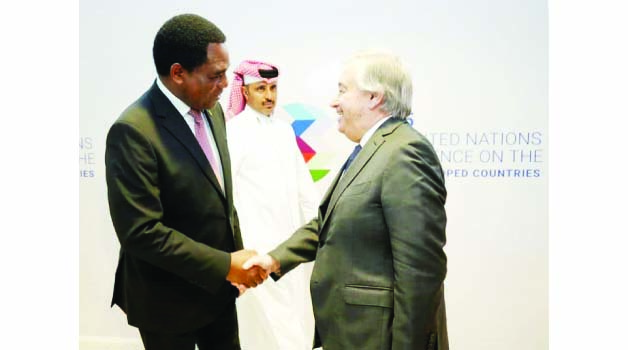
By MARTIN MUSHUMBA –
WHEN the Fifth United Nations Conference on the Least Developed Countries (LDCs) came to a close recently, it was without doubt that Zambia and indeed the conference had made their position clear on the need to mobilise international assistance to accelerate development and build prosperity for the people.
Mr Hichilema did the most from the conference, featuring in plenary sessions, parallel high-level thematic roundtable meetings and a series of parallel and side events on various thematic priorities where he networked with his counterparts and many development support organisations.
His many submissions at the event resonated with Zambia’s agenda for prosperity.
To begin with, the theme of the conference “From Potential to Prosperity” sat well with the aspirations Mr Hichilema holds for Zambia.
He has openly stressed his discontentment about Zambia being a rich country with poor citizens and, therefore, seen the need for the southern African nation to move from its potential evidenced by the vast natural resource endowment to creating prosperity for the citizens.
At the conference, Mr Hichilema ably recognised that the event was a once-in-a-decade opportunity to accelerate sustainable development in the places where international assistance was needed the most.
Mr Hichilema stressed that the event was important because it presented an opportunity for the world to tap the full potential of the LDCs by helping them make progress on the road to prosperity.
He indisputably presented Zambia’s race against time in meeting the Agenda 2030 and the Sustainable Development Goals.
The President also noted that global recovery depended on LDCs getting the international support they needed.
His clarion call was for enhanced investments in health, education and social protection systems.
He also noted that the journey towards attaining the Agenda 2030 was not only dependent on governments but also the private sector, civil society, parliamentarians and young people who all had a key role to play and thus needed to be included and consulted.
Mr Hichilema emphasised the need for investing in people through expanding education accesses for all.
He submitted that education opens doors for success as it expands opportunities for individuals, and human capital for countries.
His passion on eradicating poverty was clear as he dwelled on the need for sustainable development initiatives that transform families and societies.
He was clear that building capacity in individuals stands out as one sustainable way to eradicate poverty.
In his various presentations, Mr Hichilema was clear about the need for LDCs to leverage the power of science, technology and innovation in their development.
He noted the need for LDCs to rely on science to add value to the vast raw materials being exported to the developed countries.
In this regard, his emphasis was on supporting structural transformation as a driver of prosperity, and that key to this is developing capacity to add value to raw materials.
Local enterprises must partner with international organisations with financial resources, expertise, and technology to optimise value addition in various sectors such as mining, manufacturing, and agriculture among others.
Mr Hichilema emphasised the need for enhanced economic diplomacy among LDCs.
His point was that LDCs must begin by enhancing international trade within them.
Enhancing international trade and regional integration must be prioritised and barriers to trade must be eliminated.
He also was clear about the need to invest in good transport network in order to enhance regional integration.
Last but not the least, the Zambian head of state was clear that climate change affected everyone including the LDCs.
The challenges of global pandemics, floods, and droughts among others were slowing down development calling for the need to tackle climate change and build resilience.
He called for LDCs to mobilise international support and Partnership to enhance sustainable development.
Clearly, Mr Hichilema understands the needs of the country and the challenges faced in Zambia’s bid to attain sustainable development.
Similarly, like Zambia, all the LDCs are in dire need of achieving structural economic transformation, increase productive capacity, reduce poverty and build resilience to adverse factors in order to move from potential to building prosperity for the citizens.
This understanding is critical in unlocking the country for its much desired development.
Mr Hichilema’s knowledge of what needs to be done and what is inhibiting the progress is crucial in identifying the policy options which the government must be exploring to change the country’s development narrative.
The author is a public and economic policy analyst






